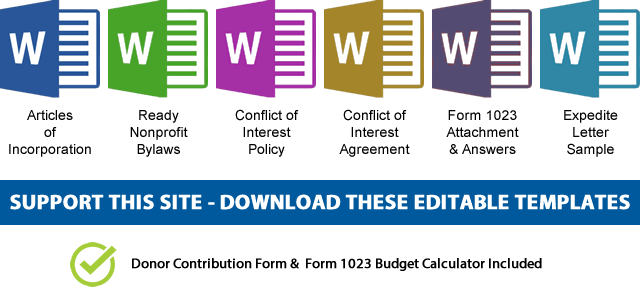IRS Nonprofit Examinations (Audit) versus Compliance Checks
When the IRS decides to audit an exempt nonprofit organization, the review of a tax-exempt organization falls into one of two categories: compliance checks or examinations. Here we take a look at the IRS audit procedures of a tax exempt nonprofit organization.
- Examinations, also known as audits, are authorized under Section 7602 of the Internal Revenue Code. For exempt organizations, an examination determines an organization’s qualification for tax-exempt status. EO conducts two different types of examinations: correspondence and field (described below).
- A compliance check is a review to determine whether an organization is adhering to record keeping and information reporting requirements. It is not an examination since it is not related to the determination of a tax liability for any particular period.
IRS Exempt Organizations department does not presume that an organization is violating the tax laws before it begins the Audit (examination) or sends a compliance check letter. IRS Exempt Organizations (EO) promotes voluntary compliance through its examination and compliance check programs. EO strives to ensure consistency and fairness in these programs. In its annual Implementing Guidelines, which are available on the IRS website at www.irs.gov/eo, EO describes its proposed examination and compliance check activities for the year.
IRS Nonprofit Correspondence Examination versus Field Examination
IRS examiners (auditors) conduct audits of exempt organizations in various ways:
Correspondence examination: The examiner conducts the audit orally or in correspondence with the organization’s officers or representatives. These audits are often limited in scope, focusing on only one or two items on a return. On occasion, if the issues become complex or if the organization does not respond to correspondence efforts, IRS Exempt Organizations department may require representatives from the organization to bring their records to an IRS office. EO may also convert a correspondence examination into a field examination.
Field examination: The examiner conducts the audit at the organization’s place of business. Generally, these exams are the most comprehensive. There are two distinct types of EO field examinations:
- EO Team Examination Program for examinations which necessitate a team of specialists.
- EO General Program, in which an examination is performed by an individual revenue agent.
The IRS typically uses team exams for the largest exempt organizations.
Initial Contact by the IRS Examiner
For field audits of a tax-exempt 501c3, the agent assigned to examine an organization will contact it by telephone or letter to schedule an initial appointment. The organization will receive Publication 1, Your Rights as a Taxpayer, with the appointment letter. In the appointment letter, the examiner will specify the records he or she wants to have available at the beginning of the audit. Nonprofit audit checklist generally include:
- Governing instruments (articles of incorporation, charter or constitution, including all amendments; bylaws, including all amendments)
- Pamphlets, brochures and other printed literature describing the organization’s activities
- Copies of Forms 990 for the years before and after the year under audit
- Minutes of meetings of the board of directors and standing committees or councils
- All books and records of assets, liabilities, receipts, and disbursements
- Auditor’s report, if any
- Copies of other federal tax returns filed and any related work papers (Forms 990-T, 1120-POL, etc.)
- Copies of employment tax returns and any related work papers (Forms W-2, W-3, 941, 1096, 1099)
Many of these records may also be required for a correspondence examination.
The process of IRS audit of a tax-exempt 501c3 nonprofit organization
Opening Conference and Initial Interview for Field Examination
During an opening conference with the organization’s officers or representatives, the examiner will explain the audit plan he or she has developed and the reason the organization has been selected for audit. The examiner will usually conduct a comprehensive interview and tour the organization’s facilities to gain a basic understanding of its purposes and activities.
Length of Field Examinations
The length of the examination depends upon several factors: including the size of the organization, the complexity of its activities and the issues that may arise during the examination. Some audits are completed in a few days, while others last for weeks or months.
Closing Conference for Field Examinations
Every field examination ends with a closing conference. The agent will discuss his or her findings and, if necessary, furnish a report explaining the results of the examination and any proposed adjustments to the organization’s returns or exempt status.
If the organization disagrees with the examiner’s findings, it may request a meeting with the examiner’s manager to discuss the disagreement. If the manager cannot resolve the differences, the organization may pursue its case through the IRS appeals process.
For more information, see Publication 5, Your Appeal Rights and How to Prepare a Protest If You Don’t Agree or Publication 892, EO Appeals Procedure for Unagreed Issues.
IRS Nonprofit Compliance Checks
IRS Exempt Organizations department maintains an active compliance check program. EO specialists conduct the checks by corresponding with organization representatives. A specialist may inquire about an item on a return, determine if specific reporting requirements have been met, or whether an organization’s activities are consistent with its stated tax-exempt purpose.
An officer or representative of any exempt organization may refuse to participate in a compliance check without penalty. However, EO has the option of opening a formal examination, whether or not the organization agrees to participate in a compliance check.
A compliance check is not an examination. Hence, it is possible to have more than one compliance check for a tax year if facts and circumstances warrant. For more information, see Publication 4386, Compliance Checks.
Public Complaints Related to Alleged Abuse of Tax-Exempt Status
The IRS gives serious consideration to complaints made alleging the abuse of the tax-exempt status granted to certain organizations.
A complaint (also called a referral) is any communication alleging that a tax- exempt organization is in potential noncompliance with the tax law. EO receives complaints from the general public, members of Congress, federal and state governmental agencies, as well as from other parts of the IRS. A referral of an exempt organization may be made by submitting Form 13909, Tax-Exempt Organization Complaint (Referral) Form.
After a referral is made, the IRS will send an acknowledgement letter to the referral source, unless it was made anonymously. Section 6103 of the Code prohibits the IRS from disclosing whether it has initiated an examination or the results of any examination. Therefore, the IRS cannot communicate with the original source of a referral beyond the acknowledgement letter.
 NOTE: If you’d like to receive the following organizing documents:
NOTE: If you’d like to receive the following organizing documents:- Nonprofit Articles of Incorporation,
- Nonprofit Bylaws,
- Nonprofit Conflict of Interest Policy,
- Conflict of Interest Policy Acknowledgment,
- Form 1023 Attachment with all the answers,
- Form 1023 Expedite Letter template,
- and Donor Contribution Form
in Microsoft Word Document format, please consider making a donation and you’ll get to download them immediately. Not only they're worth well over $1000 in value, they will save you weeks of copy pasting and formatting as they are ready to go templates which only need changing names and addresses.

